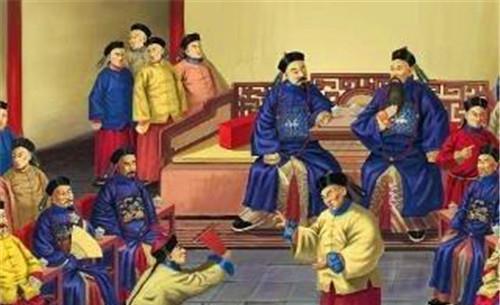China has a history of thousands of years, during which the bureaucratic system has also formed its own system, with the continuous strengthening of the central imperial power, power is increasingly in the hands of the rulers, the emperor in order to be able to consolidate his rule, maintain the balance of the various factions under his hands, but also a lot of painstaking efforts. Empress Dowager Cixi was very good at exploiting the contradictions between the Foreign Affairs faction and the conservative faction under her subordinates to achieve the purpose of checks and balances, which is the main reason why the late Qing Dynasty, although crumbling, has not collapsed.

And the official position that comes next can be said to be the victim of the power struggle, which is the most often heard of as the admiral. The full name of the Admiral is the Chief Military Officer of the Admiralty, officially born in the Jiajing period of the Ming Dynasty, the Beijing Barracks has the Admiralty General Officer, responsible for the military affairs of the local troops, and was further used in the Qing Dynasty.
What do we often mean by "Nine-Door Admiral"? His official name was "Commander of the Infantry Army of the Five Battalions of the Nine Gate Patrols", and he was mainly responsible for the guarding and access control of several gates in the inner city of Beijing, such as Zhengyang Gate, Xuanwu Gate, and Anding Gate, and was also responsible for night patrol and fire fighting, and was actually the commander of the Qing Dynasty capital defense force and the person in charge of protecting the security of the imperial palace.
There are also local admirals, after the Qing army entered the customs, a total of nineteen governors were set up in each province, commanding the officers and men of the green battalion in each region, which was the highest-ranking officer in name in a province, and by the middle of the Qing Dynasty, the Eight Banners troops relied on by the Qing Dynasty had seriously declined due to their long-term comfort, and the Qing court began to rely more and more on the green battalions and other units formed by the Han people, and by the time of the Xianfeng Emperor, there were more than 600,000 green battalion soldiers in the country, which was three or four times that of the Eight Banners troops. The Admiral also became in effect the commander of the main force.
But why is it said that the Admiral is the most depressing position? As the highest-ranking military attaché, the rank of the viceroy belongs to Yipin, in addition, the governor who administers the administration of military economy in a province or several provinces is called the governor, and his official rank is Zhengerpin, and the rank of local inspector is lower, which is from Erpin.
According to the reason, the admiral should be more powerful than the governor and other people, in fact, on the contrary, the rulers of the Qing Dynasty did not give them the military power so confidently, and the green battalion was generally directly under the command of the military department, in order to prevent the soldiers from supporting the army and respecting themselves, the general could not directly command the army. In the event of war, the commander-in-chief had to ask the imperial court for instructions everywhere, which also delayed the Ability of the Qing Army to fight.
The local governors, on the other hand, had much more power, they had military jurisdiction, and they had the responsibility of supervising local officials, which meant that they could also control part of the administrative power of the region, although the governor's rank was lower than that of the viceroy, but the imperial court would also grant them other titles, such as the title of Shoshu of the Bingbu.
When Zeng Guofan, the governor of Liangjiang, led an army to quell the rebellion of the Taiping Heavenly Kingdom, the imperial court added him the official title of "Prince Taibao", which was actually a pin official.
Therefore, the governor leads the army to fight, but will be subject to the governor's restraint, the Qing Dynasty every three years to the court officials to conduct an examination, the governor and the inspector as the chief inspector, but the governor is also within the scope of this assessment, they also have to swallow their voices to accept the subordinate investigation, you say they do not hold back?
Therefore, many court officials took office as viceroys, often rising from the bright to the dark, and in the past, the emperors of the dynasty would also set up such official ranks that did not have much real power, such as the lieutenants of the Song Dynasty and so on. At the end of the Qing Dynasty, the most famous ministers, Li Hongzhang, Zhang Zhidong, and Zeng Guofan, their achievements were also written down in the position of governor of the governor, and the Qing Dynasty had never heard of any viceroy breaking into the name.